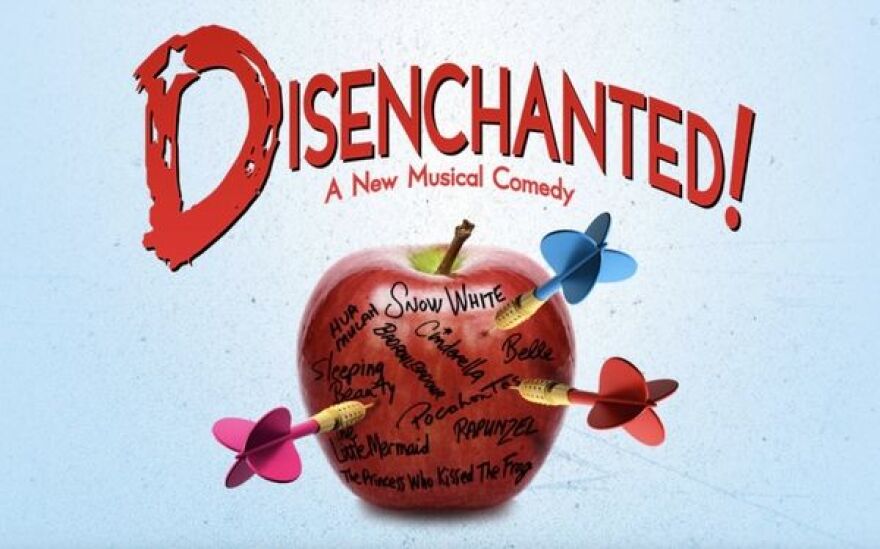Dennis Giacino’s Disenchanted is an unapologetic rebuke of P.C. – no, not political correctness, but the misogynistic Princess Complex that Disney permeates each of Disney’s princess sagas from Snow White and Cinderella to Beauty and the Beast and The Little Mermaid - or, as Snow White, succinctly puts it:
“You know, that age old idea in which you are only desirable – and valid – if you are a beauty-obsessed, ditzy, insecure Bambi-like waif.”
The disenchanted instigators in Giacino’s musical are a brassy, no-nonsense Snow White unflinchingly played by Margaret Bowman, Snow’s less evolved but endearingly perky, quirky first lieutenant, Cinderella, blissfully played by Cassy Terwilliger, and the sonorous Sleeping Beauty, lovingly played by Cassy Sampson.
“Forget the princesses you think you know,” states the tag line promoting the show, “the original storybook heroines have come back to life years and years after their supposed ‘happily ever after,’ and they’re not too thrilled with how things turned out.” But that’s more than a bit misleading. This ain’t no girls’-night-out beatch session. The girls have a bone to pick with their old buddy Walt and the Brothers Grimm. With some exceptional vibrato and a whole lot of angst and gravitas, they bippity boppity bust out a little princess show of their own to tell you that what they really want in life is to be taken seriously and be seen for the strong capable people they actually are.
Isn’t that what every modern woman wants in today’s male-dominated work-and-play world?
And toward that end, Bowman, Terwilliger and Sampson employ their powerful pipes to savage the assumptions underlying the Princess Complex.
Like the assumption that a princess just sits around waiting for a prince to come and sweep her off her feet. Or its corollary – that when the prince finally deigns to show, she’ll swoon, instantly fall in love and marry soon after.
“Sleeping Beauty was kissed by a very handsome prince and awoke from a hundred year sleep. She instantly fell in love with the prince and soon after, they were married.”
Fairy tales may promise a happily ever after but, in reality, the Princess Complex they indoctrinate encourages girls to become passive, helpless damsels in distress who will, without complaint, subjugate their dreams, desires and passion for the prince in their life.
Such as Belle, that smart and witty bookworm from classic French literature who is trapped in a lonely relationship with her uncouth beast of a husband she’s forced to clean up after. She can’t shut off the interminable chatter in which she engages with her tea pots, cookware and even her bidet. And it’s driving her insane, as an exasperated Katherine Freeman sings in number reminiscent of “Beauty School Dropout” from Grease.
“What the hell?
Has Mickey lost his mind
This is so lame
That a mouse could be
So damn unkind
To a girl from classic lit
Who babbles on now like a twit
With pottery, furniture, carpeting
God, this is shit
And it’s driving me insane
Insane
Ah-ah-ah"

Next up is Hua Mulan, a beautiful, dutiful, virginal (she swears) Asian girl with bangs like K.D. Lang’s, who’s fine with some Gertrude Stein.
“I wonder why, I didn’t get the guy,” croons Dakota Johnican, who adds more rich vocals to a cast that could give Pitch Perfect’s Bellas a run for the money.
“Then it occurred to me that I just might be … lesbian.” With a wink of the eye, Mulan encourages one and all to say good-bye to the old standard. Because given the chance, what woman wouldn’t want to be the one wearing the pants. And that’s true regardless of sexual identification or orientation. That’s for sure.
After Mulan it’s Sleeping Beauty’s turn to detail her PC problems, but snap, after her 100-year nap, the poor thing seems to be experiencing some inopportune bouts of narcolepsy. So Snow and Cinderella call up the next act featuring The Little Mermaid, just of the halibut.
The Little Mermaid makes an even worse bargain than Belle to be with her prince. Channeling her inner Kelsea Ballerini, Megan McDonald chafes at the notion that to gain love, women are expected by society to even sacrifice who they really are deep down inside just to net a man.
Oh, she loves her husband, but the price of love was too much. Now she questions the wisdom of sacrificing her true self “for a prince and a pair of these.” Legs, she’s discovered, are no bargain.
There’s the discomfort of shaving the damn things. And not only is she an unsteady red-headed bipedal fish out of water, she has to cross her legs when sitting so as not to give the boys a peek and then spread them to get laid. It’s such a lot to ask.
"Two legs too many
I’d gladly dump my six-inch heels
To jump back in with the Moray Eels
Too Late
To turn back now
I can’t believe I swapped the seven seas
For a prince and a pair of these"
“You’re not going to see that on Disney Plus,” Snow White observes tongue-in-cheek when the song is done. The Princess Complex is multi-dimensional.
On one level, it imposes on young girls and women a set of behavioral prescriptions that that influence their values, self-esteem and body image.
But PC also has a sinister commercial component that the entertainment industry and Madison Avenue gleefully use to market and sell every product and service imaginable under the sun.
Like perfume.
It’s all the more deplorable if you’re Indigenous. Just ask Pocahontas, poignantly played by Sophia Brook. To cash in here, Disney not only altered her place in history, it homogenized and sexualized her.
"And honestly
I was only ten
But now I’m twenty-three
Can anyone explain
Why leaves keep following me
And why my story can’t be told
Honestly"
Then there’s Disney’s tenuous relationship with people of color, like the Princess Who Kissed a Frog, played by Maliyah Mattis. Don’t be fooled. It wasn’t PC or wokeness that caused Disney to finally give a sista a song. It was the Benjamins.
"Cuz I am that Storybook Princess
That’s fin’lly gone black
Yeah
Now I’m sure it took persuasion
To draw me darker than Caucasian
I’m not dense
It’s dollars and cents!
My plush dolls wouldn’t hit the rack
Unless it made good bus’ness to bet on Black"
While she’s thrilled that her childhood fantasy’s finally come true, she’s a wide-eyed realist who knows that “a princess got some color just to make some loot.”
Body image issues leading to struggles with anorexia, bulimia and bullying are the consequence of PC Rule #323, relates Cinderella, who looks into the audience and says, “We never eat.”
This is perhaps the most humorous song in the show, containing a recitation of all the junk food and sweet indulgences that women have to deny themselves. Even though eating disorders are no laughing matter, the sight gags and facial expressions are a hoot.
And the highlight of the number is a little rap riff digression that Freeman’s Little Mermaid dives into as she talks up the pleasures of eating sushi. It’s a scene you really have to experience for yourself.
To this point in their one-hour princess show (after all, no one wants to watch a performance that goes on longer than that), Snow White has been biding her time.
Now she’s ready to vent on all those Prince Charmings who expect the women in their lives to do what they’re told without comment or complaint.
Cinderella and Sleeping Beauty sing back-up …. producing a triangle and a duck call to drown out the profanity now spewing form Snow’s scarlet lips as she delivers an ultimatum to any Prince Charming who has the temerity to suggest that it’s a woman’s lot in life to whistle merrily while they do all the household and other chores.
“If that’s the fairy tale he wants, he can go triangle himself, and when he wants the bathroom cleaned, he can eat duck call and triangle die.”
Political correctness and the PC aside, all three agree, if their guys don’t change, “I’ll simply say duck you.”
A seasoned playwright, Giacino saves the show’s most poignant moment until the end. It happens when Snow White is forced to confront the reality that even the feminist in charge can be both the victim and the perpetrator/progenitor of misogynist thinking.
Snow intends to cut Sleeping Beauty’s song from the show because “Princess Ambien” slept through her scheduled performances. But Sleeping Beauty stops Snow in her tracks with a simple question.
"Aren’t you requiring me to meet your own definition of perfection, and how is that different than living up to the definition of perfection imposed by the Princess Complex?"
In an Eleventh Hour rendition of “Perfect,” Cassie Sampson provides the solution to the riddle of why she sleeps so much. She’s battling clinical depression!
“When I sleep, I dream I’m perfect, ‘cause that’s the girl I’m told to be.” But the truth is, everyone has their own je ne sais quoi. Everyone is “perfectly me.”
For audiences, though, there’s more here than Dennis Giacino’s clever script and lyrics. Director Tyler Young’s cast of incredibly gifted singers make this show well worth seeing. The only downside to the production is that because of its adult themes and sexual innuendo, Dis’ sobering message may not reach those who need to hear it most – the impressionable little girls and boys who feed on once-upon-a-times and happily-ever-afters.
Disenchanted runs at The Belle Theatre in Cape Coral September 28th through October 8th. Go here for play dates, times and a full cast list.
To read more stories about the arts in Southwest Florida visit Tom Hall's website: SWFL Art in the News.
Spotlight on the Arts for WGCU is funded in part by Naomi Bloom, Jay & Toshiko Tompkins, and Julie & Phil Wade.




